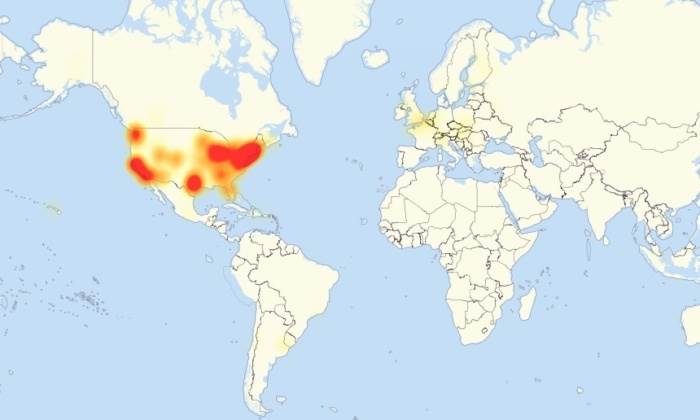Botnets created from the Mirai malware were involved in Friday’s cyber attack.

A map of Friday’s massive DDOS attack and the internet outages involved.
Credit:
Downdetector
A Chinese electronics component manufacturer says its products inadvertently played a role in a massive cyberattack that disrupted major internet sites in the U.S. on Friday.
Hangzhou Xiongmai Technology, a vendor behind DVRs and internet-connected cameras, said on Sunday that security vulnerabilities involving weak default passwords in its products were partly to blame.
According to security researchers, malware known as Mirai has been taking advantage of these vulnerabilities by infecting the devices and using them to launch huge distributed denial-of service attacks, including Friday’s outage.
“Mirai is a huge disaster for the Internet of Things,” Xiongmai said in an email to IDG News Service. “(We) have to admit that our products also suffered from hacker’s break-in and illegal use.”
Mirai works by enslaving IoT devices to form a massive connected network. The devices are then used to deluge websites with requests, overloading the sites and effectively taking them offline.
Because these devices have weak default passwords and are easy to infect, Mirai has been found spreading to at least 500,000 devices, according to internet backbone provider Level 3 Communications.
Xiongmai says it patched the flaws with its products in September 2015 and its devices now ask the customer to change the default password when used for the first time. But products running older versions of the firmware are still vulnerable.
To stop the Mirai malware, Xiongmai is advising that customers update their product’s firmware and change the default username and passwords to them. Customers can also disconnect the products from the internet.
Botnets created from the Mirai malware were at least partly responsible for Friday’s massive internet disruption, according to Dyn, the DNS service provider targeted in the assault.
“We observed 10s of millions of discrete IP addresses associated with the Mirai botnet that were part of the attack,” Dyn said in statement.
The DDOS attack, which flooded sites with an overwhelming amount of internet traffic, slowed and stopped access to Twiiter, Spotify, PayPal and many more services.
Although Dyn managed to fend off the disruption and restore access to its service, Mirai-powered botnets could easily strike again. Earlier this month, the unknown developer of the Mirai malware released its source code to the hacker community. Security firms have already noticed copycat hackers using it.
The Mirai malware also appears to target products from other IoT vendors that use weak default passwords in their devices. Security experts have noticed the malware tries a list of more than 60 combinations of user names and passwords.
Last month, a Mirai-powered botnet also briefly took down the website of cybersecurity reporter Brian Krebs, by delivering 665 Gbps of traffic, making it one of the largest recorded DDOS attacks in history.







